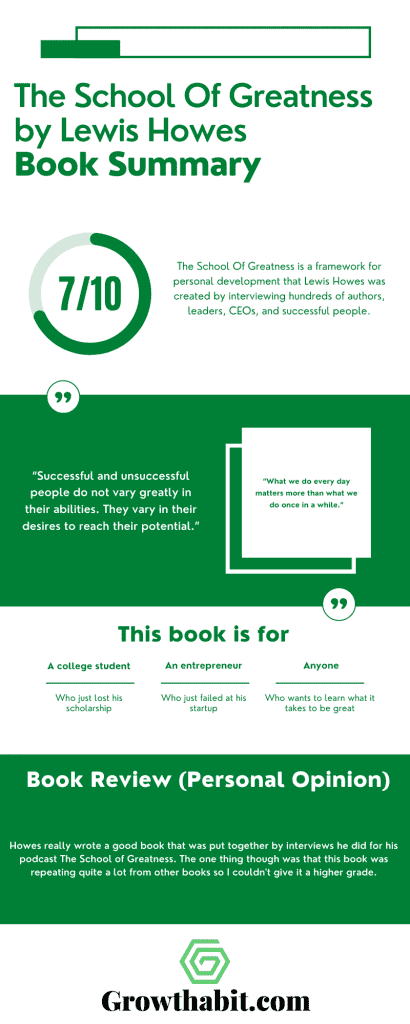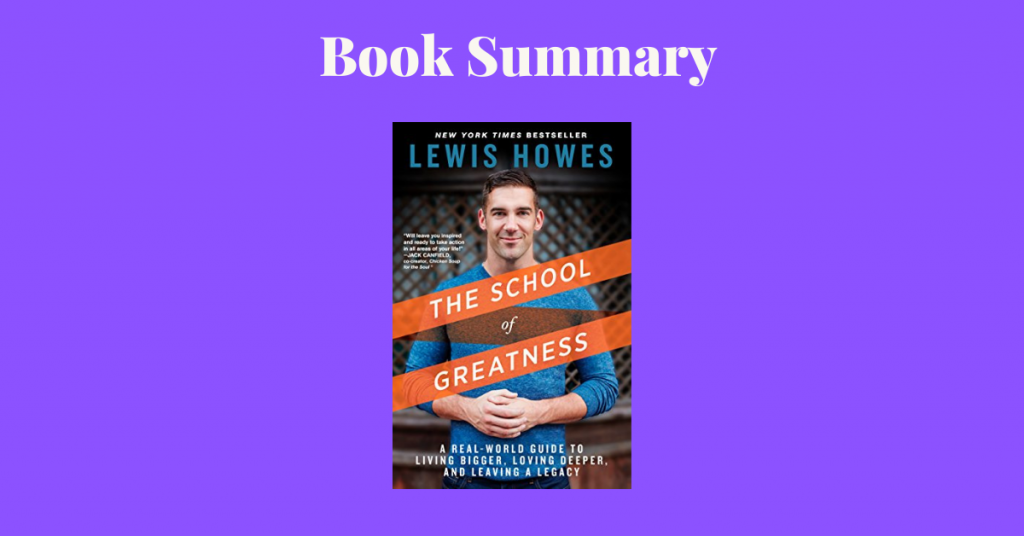The School Of Greatness is a framework for personal development that Lewis Howes was created by interviewing hundreds of authors, leaders, CEOs, and successful people.
Book Title: The School Of Greatness
Author: Lewis Howes
Date of Reading: November 2017
Rating: 7/10
What Is Being Said In Detail:
The School Of Greatness is a framework that consists of eight parts, divided equally into eight chapters:
- CHAPTER 1: CREATE A VISION
- CHAPTER 2: TURN ADVERSITY INTO ADVANTAGE
- CHAPTER 3: CULTIVATE A CHAMPION’S MINDSET
- CHAPTER 4: DEVELOP HUSTLE
- CHAPTER 5: MASTER YOUR BODY
- CHAPTER 6: PRACTICE POSITIVE HABITS
- CHAPTER 7: BUILD A WINNING TEAM
- CHAPTER 8: LIVE A LIFE OF SERVICE
Chapter 1 is all about creating a vision for your life. A vision is about being specific, letting it become your identity, and becoming what you already envision you are.
Chapter 2 is about using adversity as fuel to push yourself forward. Howes gives the example of Ryan Holiday here.
Chapter 3 is about creating a mentality of hard working ethic, never quitting, and always striving to become the best version of yourself.
Chapter 4 is about developing hustle in four main areas of your life: your body, your mindset, your relationships, and your skills.
Chapter 5 is about eating healthy, exercising, and mastering your body so you can bring your best self to everyone around you every single day.
Chapter 6 is about creating positive habit loops. You develop small, good, and positive habits that will propel your life to success in all areas of it.
Chapter 7 is realizing that you can’t do it all by yourself and asking for help. Building a support system means finding people who uplift you and who see greatness in you even when you can’t see it yourself.
Chapter 8 is about learning to leave a legacy on Earth by contributing the most that you can to other people. To live a life of service means to live a life of meaning.
Most Important Keywords, Sentences, Quotes:
PREFACE
“Suddenly, those dreams of glory and fame came crashing down to earth. It wasn’t pretty. I was 24 years old, washed up, broke, and sleeping on my sister’s couch with my arm in a cast and a mountain of credit card debt staring me in the face. My dreams vanished. What I was living through at that point was a nightmare—and I feared that it was something I’d never wake up from. It was the lowest low I’ve ever experienced.”
“I eventually built this presence on LinkedIn into an incredibly lucrative speaking, advising, and teaching business. I had no background in online business, but I had good instincts and was willing to work my butt off, and as I took some advice from mentors, the money started flowing in. After an initial period of figuring it all out, my first year brought in close to $1 million in sales. By year 3, that had more than doubled. Eventually, my business partner bought me out in a deal for seven figures.”
“It’s about inspiring people, about sharing a message, about believing the truth in that cliché: It’s the journey, not the destination to some perceived treasure or moment of adulation. In fact, there are a million ways to be great and a million more things to be great at. Most of them don’t come with a medal or a giant check.”
CHAPTER 1: CREATE A VISION
”Successful and unsuccessful people do not vary greatly in their abilities. They vary in their desires to reach their potential.”
“The famed World War II general and French president Charles de Gaulle is reported to have said, “Greatness is a road leading towards the unknown.” And he was right, but only in a particular sense, I think.”
“You become what you envision yourself being.”
“The seasons where coaches had us write out our team vision and our personal goals were the most successful seasons I ever had. That shared vision provided a foundation for the team. Without it, we were athletes playing without greater purpose. Having that purpose and knowing why we were playing enabled the members of those teams to sacrifice for each other in ways the visionless teams never could.”
“Answer these questions. Who am I? What do I stand for? What is my vision for myself, my family, and the world? List your five principles (Personal Principles Declaration)”
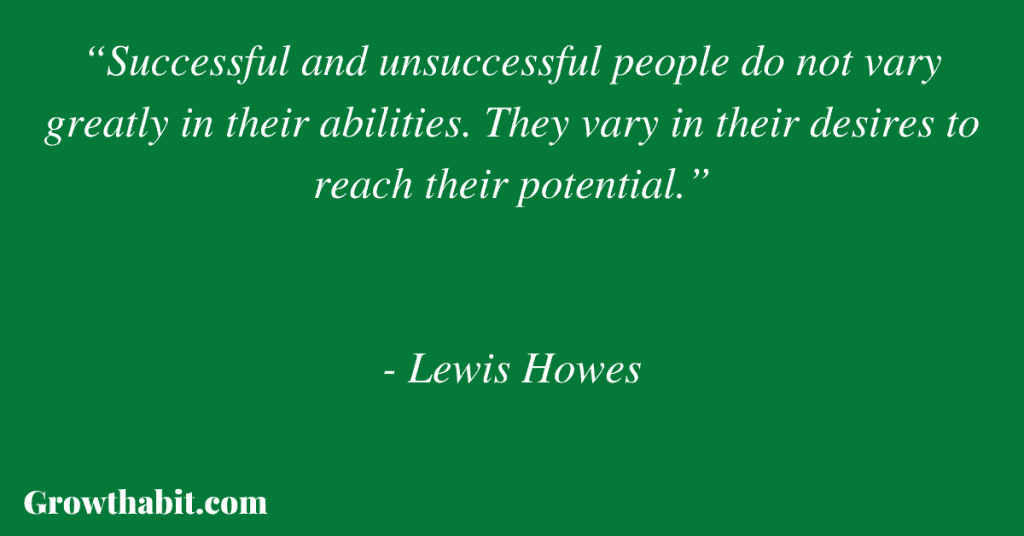
“Here is my PPD. 1. Love myself, everyone, and everything. 2. Be in service to support others and the world. 3. Always give my best and strive for greatness in everything I do. 4. Live in abundance. 5. Create a win/win with everything.”
“When adversity arises, you have two choices: (1) Do nothing, let it overwhelm you, and fall victim to your circumstances, or (2) embrace the challenge and move toward the adversity, making it part of your success story. Prepare yourself for these moments, because they are going to happen in all areas of your life whether you like it or not. When you understand this and learn to embrace adversity, then you can learn to overcome it and use it to your advantage.”
CHAPTER 2: TURN ADVERSITY INTO ADVANTAGE
“Creating a vision is about clearly defining what you want (your goals) and who you want to be (your dreams).”
“Anyone can tell themselves they have a vision for what they want to create in the world, but it is our actions that dictate what we create in reality, where anything can (and does) happen. It is in the doing that the goals become real.”
“Greatness is what remains when that talent and vision meet adversity—and persist in the face of it.”
“The language of LinkedIn and the language of business scared me half to death when I was planted on my sister’s couch staring at the end of my career in sports (a language I was very fluent in).”
“I was a senior, and the football season was over, so becoming an All-American wide receiver was clearly no longer an option. I had to figure something out. There had to be another way.”
“As Ryan writes, there is “one thing that all great men and women have in common. Like oxygen to a fire, obstacles became fuel for that which was their ambition. Nothing could stop them, they were (and continue to be) impossible to discourage or contain. Every impediment served to make the inferno within them burn with greater ferocity.”
“If there is one thing you take from the School of Greatness about pursuing your vision and achieving your dreams, it should be this: You can go as slow as you need to go, but you cannot stop. You can never give up or drop out of giving your best in your life.”
“In reality, failure is simply feedback. It’s not that you are bad or not good enough or incapable. Failure (or feedback) gives you the opportunity to look at what’s not working and figure out how to make it work.”
CHAPTER 3: CULTIVATE A CHAMPION’S MINDSET
”Flow,” Steven told me, “is an optimal state of consciousness, where we perform our best and we feel our best. In flow, we are so focused on the task at hand that everything else vanishes. Time either speeds up, so 5 hours will pass by like 5 minutes, or it slows down, like that freeze-frame effect in a car crash. Your sense of self, your sense of self consciousness disappear completely, and all aspects of performance, mental and physical, go through the roof.”
“The other reason it happens is because you’ve surrounded yourself with all the necessary flow triggers. True greats have basically created the most high-flow environment they possibly could. Everything in their lives is triggering flow.”
“norepinephrine, dopamine, anandamide, serotonin, and endorphin—are the most addictive chemicals on earth. They make you quicker, faster, stronger, and more motivated. According to Steven, they do the same thing for your mental output that they do for your physical output. Talk about an aha moment.”
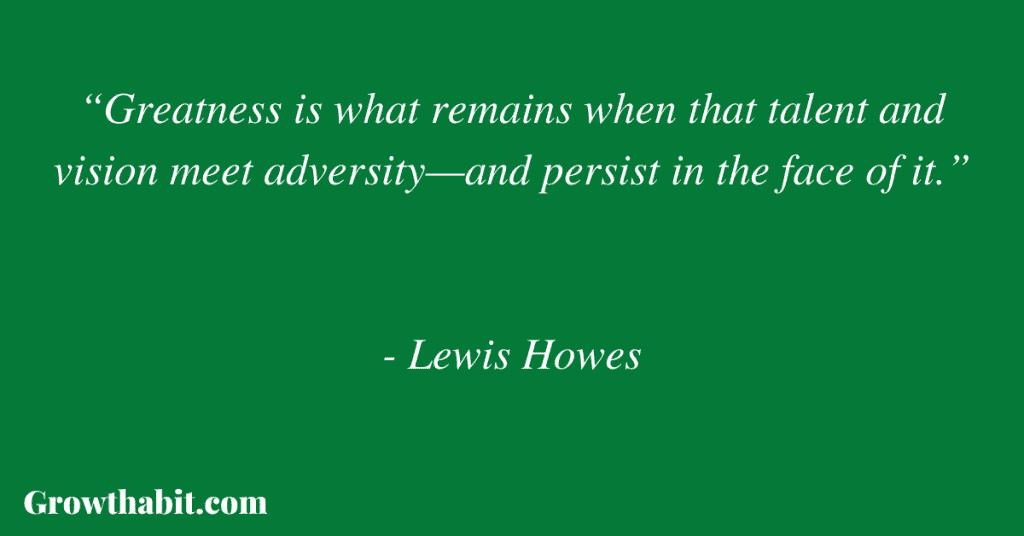
“That is why an equally important part of the champion’s mindset is the pursuit of perfection and excellence, independent of external results. This is very different from a drive to “win.” Shawn, like many athletes, isn’t obsessed with winning so much as she is with doing her absolute best: “I never focused on winning. Especially when I started out and I was in 30-something place out of 39 people.”
CHAPTER 4: DEVELOP HUSTLE
”When I got out, I was not afraid to promote myself,” Chris said. “Most people can’t get over that fear. In the arts world, you’re supposed to stay cool, man. Just do your music, and it will come to you.”
“I said, ‘Fuck that. I know what I want to do. I want to be a great jazz violinist, to go onstage with great musicians,’ and so I pursued it zealously.”
”The opportunities that can come when you do that, you can’t even predict,” she told me. “When you show up with that attitude of ‘I’m going to master this, I’m going to bring my A game,’ you feel better. You have more energy, and the results are going to be better.”
”Vision without action is a dream. Action without vision is a nightmare.”
“There are four smart areas everyone can and should be hustling in: 1. Your body 2. Your mindset 3. Your relationships 4. Your skills”
CHAPTER 5: MASTER YOUR BODY
“We need to be extremely selfish a few hours a day and take care of ourselves and our bodies,” he said. Echoing Ameer’s point, he continued, “You can’t help someone else if you are not taking care of yourself.” I’ve learned that it’s a lot like when you’re on an airplane and they say, “Put your own mask on first, before assisting others.” You can’t help anyone if your brain is oxygen starved or, worse, you’re already dead.”
“The idea of entering a CrossFit gym or training like an elite athlete may be as terrifying to you as giving a speech was to me when I went to Toastmasters the first time. But that doesn’t let you off the hook from mastering your body in the School of Greatness.”
“You can get 500 calories from sugar or you can get 500 calories from a grass-fed rib eye; your choice will have a vastly different effect on your body.”
CHAPTER 6: PRACTICE POSITIVE HABITS
“Successful people are simply those with successful habits. —Brian Tracy”
“That is the tricky secret about habits —they are best built or changed one by one, but eventually, you have to get to all of them if you want to be great. In the quest for greatness, there is no substitute for developing positive habits.”
“The tricky part about habits is that any one of them (good or bad), when you look at them individually, doesn’t seem all that critical. It’s when you take them in combination or as a whole that they become incredibly powerful.”
“A routine guaranteed to move you closer to greatness, especially if you develop positive habits related to the other lessons in the book: creating a vision, overcoming adversity, cultivating a champion’s mindset, developing hustle, mastering your body, building a team, and being of service.”

“I try to observe them for positive habits to learn what made them great. I often explicitly ask about their habits when they appear on my podcast. The reason? I want to see which habits I should deploy in my own life.”
“What we do every day matters more than what we do once in a while.”
“I’d go through life solo proving others wrong. That ended up emotionally draining me and was stressful beyond belief (not to mention very lonely). It wasn’t until I began allowing others to support my dreams and me that life started to come to me with ease.”
CHAPTER 7: BUILD A WINNING TEAM
“I’ve learned: You need to get everyone rowing in the same direction, and the only way you do this effectively is by cultivating the kinds of strong relationships where heading in the same direction feels like the only option.”
“You will never outperform your inner circle. If you want to achieve outer success, improve your inner circle.”
”Let’s be honest, you can’t get rid of a family member, right? So what I realized was rather than the amount of time I was allotting every week to conversation, maybe it’s half that. It really is a great challenge, but governing who you put in your circle is one of those places where your decision making will impact you greatly.”
“It reminds me of a quote by Edmund Lee, who encouraged people to “surround yourself with the dreamers and the doers, the believers and the thinkers, but most of all, surround yourself with those who seek greatness within you even when you don’t see it yourself.”
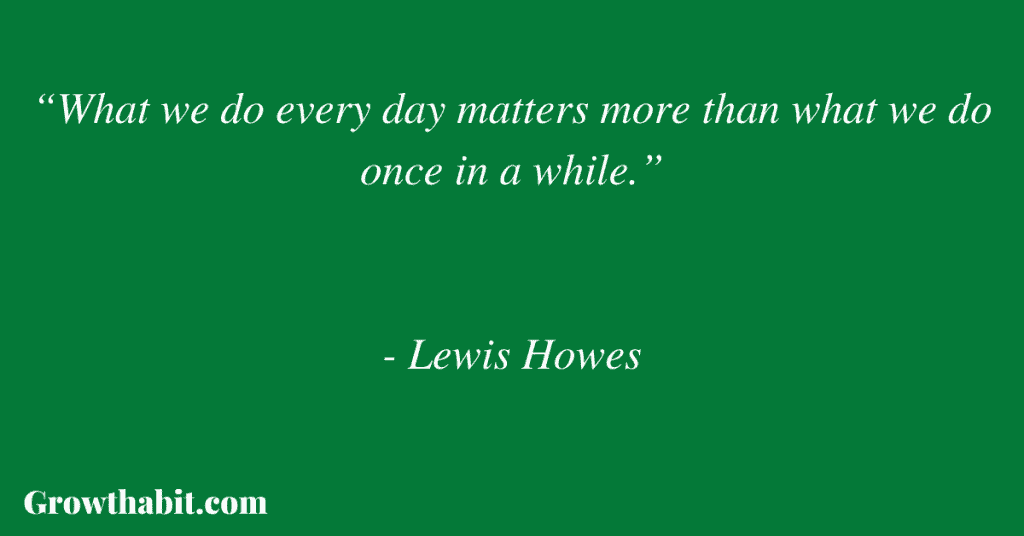
”You’ve got to realize,” he told me, “the only way to scale is to delegate and to empower others and to say, ‘You know what? They’re not going to do it exactly like me, but they’re going to do it exactly like them.”
“People matter. And you can’t achieve anything great on your own. Letting people know how much they matter and how much you care about them is equally important (if not more). The saying goes that “people don’t care about how much you know until they know how much you care.” This is true in family, sports, business, and any other situation in life.”
CHAPTER 8: LIVE A LIFE OF SERVICE
“The best way to find yourself is to lose yourself in the service of others. —Mahatma Gandhi”
“As much as I’m a passion-driven person, my background helped immensely because I’m now an entrepreneur who filters every decision through the question ‘Will this provide long-term ROI?’” he said. “I always wanted to build an organization with the head of a great business and the heart of a humanitarian idealist.”
“The article didn’t come out and say it, but what it alluded to was that as people age, they tend to find themselves consuming more and creating less. To put it bluntly: The easiest way to live a short unimportant life is to consume the world around you rather than contribute to it. Meanwhile, the people who keep on contributing tend to be the ones who keep on living. The message was clear. People who contribute to their community live longer.”
“I get the sense from many of the authors whom I’ve learned so much from that they would have written their books for free if they had to. They not only felt that some sort of muse had struck them and they owed it to their art to get it out, but they genuinely felt the world needed to hear their message and would be better if they read it.”
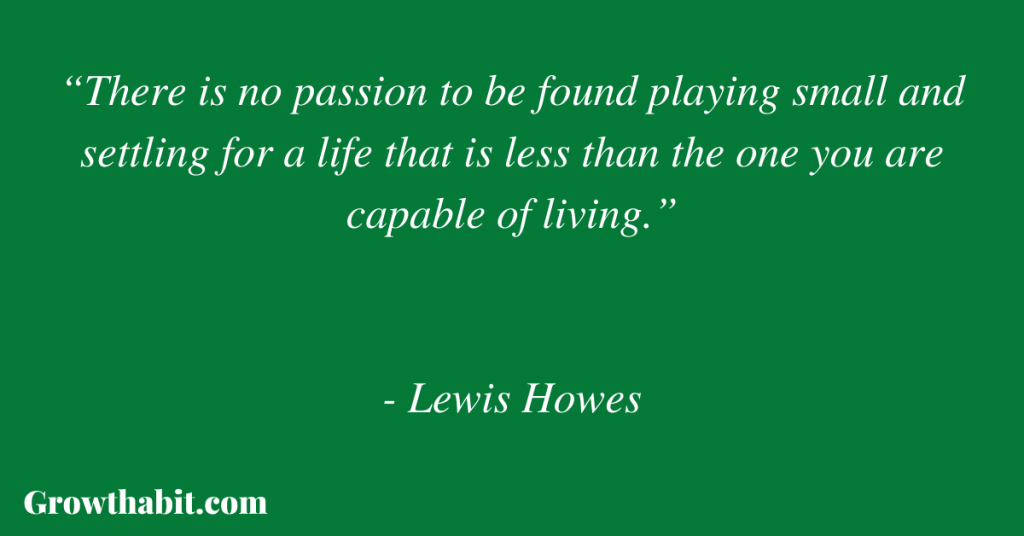
”There is no passion to be found playing small and settling for a life that is less than the one you are capable of living.”
“As he puts it, “My definition of greatness would be living a life full of purpose, love, and dignity.” I’ll add to that: for yourself and for others. I know what you’re capable of. I know you can be of service in so many ways.”
“Every aspect of your life should have a component of service. It can be as small as smiling at everyone you come across to as big and broad as you want to take it. There is no right or wrong level of giving; the key is just that you give from a place of love instead of guilt. The way I am sure to do that is a little trick I developed after flying all over the country speaking to and meeting with people just like you. I remind myself of that part of the preflight safety announcement that every flight attendant gives: Put your own mask on first. When you make sure your needs are met and you are full, then you’ll have even more energy to give to others. Go out and live a life of service!”
CONCLUSION
“In 2012, I moved from New York to Los Angeles for a girl, arriving with two big bags, a guitar, and a smile on my face. Later that night, she broke up with me. What made it worse was that my life in New York was on fire before leaving for LA!”
“We are only as good and as strong as our adversity makes us. Sometimes we don’t know what is working against us until we make our biggest mistakes, and I was about to discover that on the journey to greatness, you sometimes have to fall.”
“Greatness is a voluntary degree. Its study is self administered. That means it’s all on you. And you get out of life what you put into it. I hope you pursue it with everything you’ve got.”
Book Review (Personal Opinion):
Howes really wrote a good book that was put together by interviews he did for his podcast The School of Greatness. The one thing though was that this book was repeating quite a lot from other books so I couldn’t give it a higher grade.
Rating: 7/10
This Book Is For (Recommend):
- A college student who just lost his scholarship
- An entrepreneur who just failed at his startup
- Anyone who wants to learn what it takes to be great
If You Want To Learn More
Here’s Lewis Howes talking about his Why on a podcast:
The REASON You DON’T SUCCEED & How To Change Your FUTURE
How I’ve Implemented The Ideas From The Book
The habits part of the book was especially influential on me. I realized that you can start with small, positive habits and that they will, when combined, create massive results. That’s the one thing I really implemented from this book.
One Small Actionable Step You Can Do
The best thing you can do is the Certificate of Achievement (COA) exercise from the book. It’s literally this:
Write down your goal. Print it. Frame it. Hang it somewhere you will see it. Every day.
It’s simple to do, but it’s also simple not to do.
